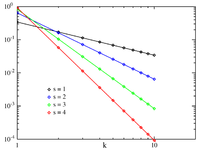
Photo from wikipedia
ABSTRACT In statistical practice, inferences on standardized regression coefficients are often required, but complicated by the fact that they are nonlinear functions of the parameters, and thus standard textbook results… Click to show full abstract
ABSTRACT In statistical practice, inferences on standardized regression coefficients are often required, but complicated by the fact that they are nonlinear functions of the parameters, and thus standard textbook results are simply wrong. Within the frequentist domain, asymptotic delta methods can be used to construct confidence intervals of the standardized coefficients with proper coverage probabilities. Alternatively, Bayesian methods solve similar and other inferential problems by simulating data from the posterior distribution of the coefficients. In this paper, we present Bayesian procedures that provide comprehensive solutions for inferences on the standardized coefficients. Simple computing algorithms are developed to generate posterior samples with no autocorrelation and based on both noninformative improper and informative proper prior distributions. Simulation studies show that Bayesian credible intervals constructed by our approaches have comparable and even better statistical properties than their frequentist counterparts, particularly in the presence of collinearity. In addition, our approaches solve some meaningful inferential problems that are difficult if not impossible from the frequentist standpoint, including identifying joint rankings of multiple standardized coefficients and making optimal decisions concerning their sizes and comparisons. We illustrate applications of our approaches through examples and make sample R functions available for implementing our proposed methods.
Journal Title: Journal of Applied Statistics
Year Published: 2019
Link to full text (if available)
Share on Social Media: Sign Up to like & get
recommendations!